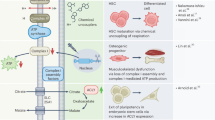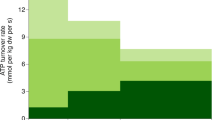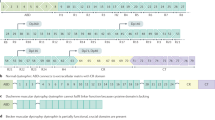Abstract
THE traditional concept that muscular dystrophy is a “primary degenerative myopathy”1 has recently been challenged, and the suggestion put forward that the disease may in fact have a neural basis. This has been based on several independent investigations, along different lines. Dubowitz2 observed “dystrophy-like” changes in the histochemical preparations of experimentally reinnervated muscle, and postulated that muscular dystrophy might be caused by an aberration of the normal controlling influence of the nervous system on muscle. In a series of electrophysiological studies in Duchenne and other forms of muscular dystrophy, McComas et al.3–5 demonstrated a marked reduction in the number of motor units. Similarly, in the dystrophic mouse it was found that many muscle fibres were functionally denervated6 and that there were fewer motor units, which were still of normal size7.
This is a preview of subscription content, access via your institution
Access options
Subscribe to this journal
Receive 51 print issues and online access
$199.00 per year
only $3.90 per issue
Buy this article
- Purchase on Springer Link
- Instant access to full article PDF
Prices may be subject to local taxes which are calculated during checkout
Similar content being viewed by others
References
Walton, J. N., Brit. Med. J., 1, 1271 (1964).
Dubowitz, V., J. Neurol. Neurosurg. Psychiat., 30, 99 (1967).
McComas, A. J., and Sica, R. E. P., Lancet, i, 1119 (1970).
McComas, A. J., Sica, R. E. P., and Currie, S., Nature, 226, 1263 (1970).
McComas, A. J., Sica, R. E. P., and Currie, S., J. Neurol. Neurosurg. Psychiat., 34, 461 (1971).
McComas, A. J., and Mrozek, K., J. Neurol. Neurosurg. Psychiat., 30, 526 (1967).
Harris, J. B., and Wilson, P., Nature, 229, 61 (1971).
Laird, J. L., and Timmer, R. F., Texas Rep. Biol. Med., 24, 169 (1966).
Jasmin, G., and Bokdawala, F., Rev. Canad. Biol., 29, 197 (1970).
Salafsky, B., Nature, 229, 270 (1971).
Bishop, A., Gallup, B., Skeate, Y., and Dubowitz, V., J. Neurol. Sci., 13, 333 (1971).
Gallup, B., Strugalska-Cynowska, H., and Dubowitz, V., J. Neurol. Sci., 17, 109 (1972).
Peterson, E. R., Alfei, L., and Crain, S. M., J. Cell Biol., 43, 104a (1969).
Peterson, E. R., and Crain, S. M., Exp. Neurol., 36, 136 (1972).
Meier, H., and Southard, J. L., Life Sci., 9, 137 (1970).
Author information
Authors and Affiliations
Rights and permissions
About this article
Cite this article
GALLUP, B., DUBOWITZ, V. Failure of “Dystrophic” Neurones to Support Functional Regeneration of Normal or Dystrophic Muscle in Culture. Nature 243, 287–289 (1973). https://doi.org/10.1038/243287a0
Received:
Issue Date:
DOI: https://doi.org/10.1038/243287a0
This article is cited by
-
Myogenic defect in human muscular dystrophy
Nature (1977)
-
Serial passaging and differentiation of myogenic cells isolated from dystrophic mouse muscle
Nature (1977)
-
Neuro-muskul�re Wechselwirkungen Ans�tze zur biochemisch-genetischen Analyse
Naturwissenschaften (1977)
-
Muscle regeneration in dystrophic mice
Nature (1976)
-
Muscle regeneration in dystrophic mice (reply)
Nature (1976)
Comments
By submitting a comment you agree to abide by our Terms and Community Guidelines. If you find something abusive or that does not comply with our terms or guidelines please flag it as inappropriate.



